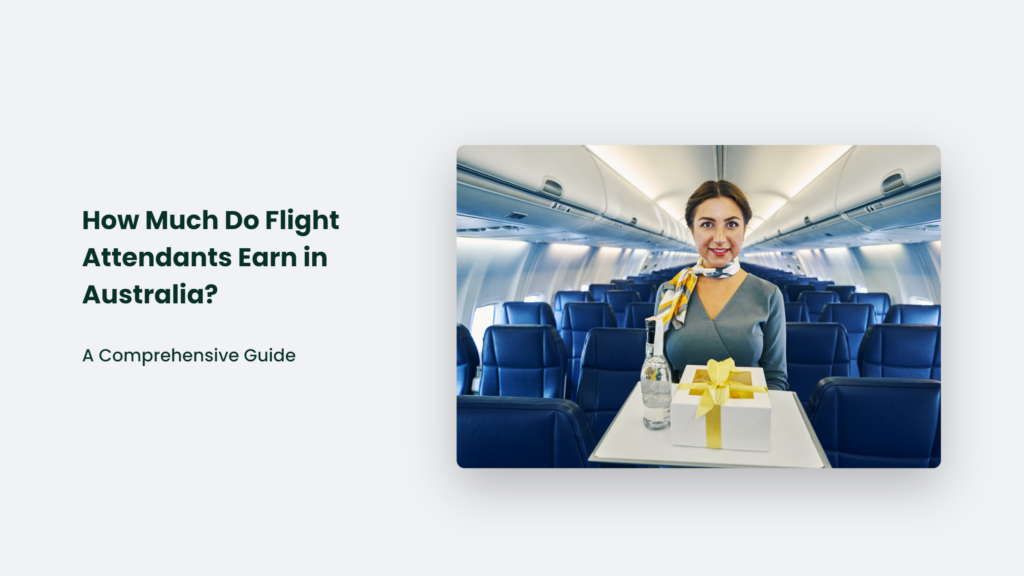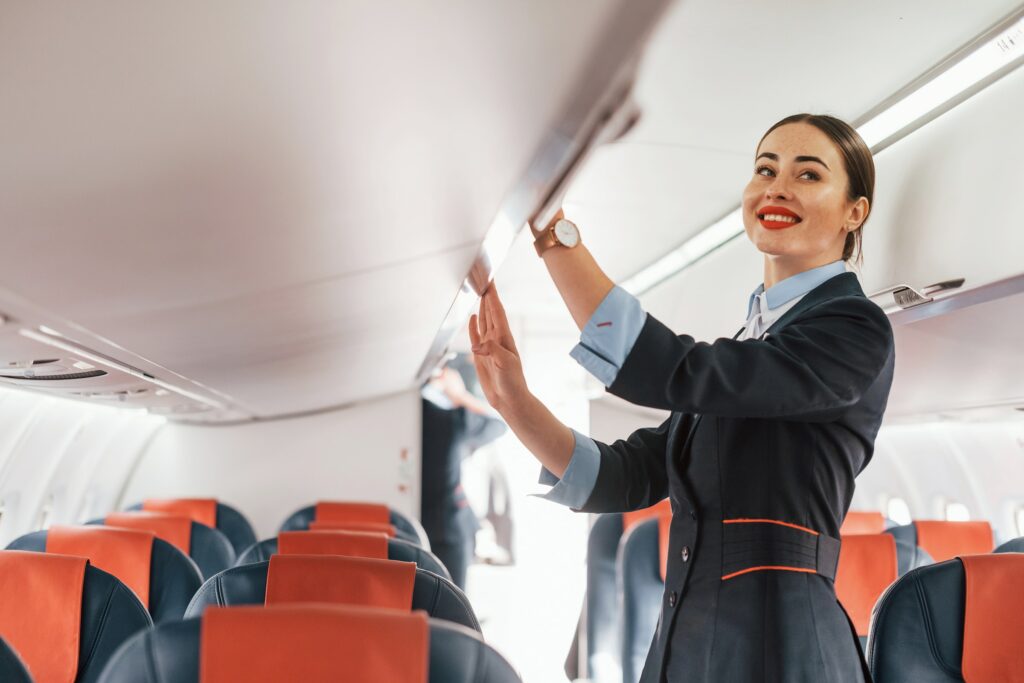“Is the sky really the limit when it comes to a flight attendant’s salary?” you might wonder as you imagine the life of a flight attendant traversing the Australian skies. Let’s delve into the financial cloud and find out how much flight attendants earn in Australia.

Understanding the Base Salary
How much do Flight Attendants Earn in Australia: The Average Salary
According to PayScale, the average salary for a flight attendant in Australia hovers around AU$ 51,225 per year. This range can vary significantly, with the lower end starting at AU$42,000 and reaching up to AU$72,000 for the more experienced ones.
How much do Flight Attendants Earn: Extra Earnings in the Sky
While the base salary forms the bulk of their income, flight attendants often receive additional financial perks. Bonuses, though not guaranteed, can add substantially to their total pay, ranging from AU$126 to AU$33,000 annually. Moreover, some might even receive profit sharing, albeit a modest amount between AU$0 and AU$750.
Beyond the Salary: Perks and Benefits
Beyond the salary, flight attendants in Australia enjoy a range of benefits and perks that enhance the appeal of their profession. These perks are not just financial bonuses; they often extend into lifestyle advantages and unique opportunities that are hard to find in other professions.
- Travel Benefits: One of the most significant perks for flight attendants is the opportunity to travel, either for free or at significantly reduced costs. It can include flights and discounts on hotels and car rentals. These benefits often extend to family members, allowing flight attendants to share their love of travel with their loved ones.
- Flexible Scheduling and Work-Life Balance: Flight attendants often have flexible schedules. While the job does require working on weekends and holidays, many airlines offer schedules that allow attendants to work in blocks and then have extended periods off. This flexibility can be particularly appealing to those who value a work-life balance and want to make the most of their time off.
- Health and Insurance Benefits: Flight attendants typically receive comprehensive health insurance packages, including medical, dental, and vision coverage. These benefits are crucial, considering the job can sometimes be physically demanding and require maintaining excellent health.
- Retirement Plans: Many airlines offer retirement plans or pensions, which is an important consideration for long-term financial security. Contributing to a retirement plan throughout their career can give flight attendants peace of mind regarding their financial future.
- Unique Experiences: The job of a flight attendant provides opportunities to meet a wide array of people from different cultures and backgrounds, making every workday a unique experience. This exposure can be enriching both personally and professionally.
- Career Development Opportunities: Airlines often provide various training and professional development opportunities. Flight attendants can advance their careers by entering senior roles, training positions, or even management roles within the airline industry.
- Employee Assistance Programs: Many airlines offer support programs to help staff deal with personal issues, whether they’re related to health, mental well-being, or financial advice. This support is invaluable, given the sometimes challenging nature of the job.
- Discounts and Perks from Partner Companies: Flight attendants often receive discounts from various businesses that partner with airlines. It can include retail stores, restaurants, and entertainment venues.
- Uniform Allowance: Some airlines provide a uniform allowance or provide uniforms directly, a practical benefit that reduces work-related expenses.
- Community and Camaraderie: Being part of a cabin crew means being part of a close-knit community. The camaraderie among crew members can be a significant source of job satisfaction and emotional support, especially when dealing with the challenges of the job.
Bonuses: The Occasional Tailwind:
Approximately 54% of flight attendants in Australia reported receiving some form of a monetary bonus. These bonuses typically range between 3% to 5% of their annual salary, which boosts their overall earnings.
Salary Growth: Climbing the Financial Altitude
While we’re discussing salaries, it’s crucial to note that the average salary increase in Australia is about 6% annually. This incremental growth indicates a steady climb in the earning potential of flight attendants as they gain more experience and seniority in their field.
Hourly Wages: Calculating Earnings by the Hour:
The hourly wage calculation for flight attendants in Australia offers an insightful perspective on their earning potential. Unlike salaried positions, where the income is fixed irrespective of the number of hours worked, the hourly wage system pays for each hour of work. This compensation method is especially relevant for flight attendants, considering their flights’ and duties’ varying lengths and frequencies.
Understanding the Hourly Wage System
- Hourly Wage Calculation: The average hourly wage for flight attendants in Australia is reported to be around 32 AUD. This rate is calculated by dividing the annual salary by the total number of working hours in a year. The standard formula used is Hourly Wage = Annual Salary / (52 weeks x 5 working days per week x 8 working hours per day).
- Factors Influencing Hourly Wages:
- Experience and Seniority: More experienced flight attendants typically earn higher hourly wages. Their skill set, knowledge, and ability to handle complex situations are valued more.
- Airlines and Contracts: Different airlines may offer varying pay scales. Larger international airlines tend to pay more than smaller domestic airlines.
- Location: Wages can also vary by location, with major cities or hubs potentially offering higher rates.
- Comparative Analysis: Flight attendants’ hourly wages are quite competitive compared to other professions with similar skill requirements and responsibilities. For example, customer service roles in other industries may offer lower hourly wages.
- Overtime and Irregular Hours: Flight attendants often work irregular hours, including nights, weekends, and holidays. Payment for these hours, especially over time, can significantly affect their total earnings.
- Impact of Flight Length and Layovers: The length of flights and the time spent in layovers can also affect the total number of working hours, thus influencing the hourly wage calculation. Longer international flights may result in more hours worked per trip.
- Benefits Included in the Calculation: In some cases, the hourly wage might reflect the base pay and other monetary benefits like per diems for layovers, which compensate for meals and other expenses while away from home.
Real-World Implications
- Budgeting and Financial Planning: Understanding their hourly wage helps flight attendants plan their finances more effectively. It clarifies how much they can expect to earn based on their schedules.
- Negotiation and Career Choices: Knowledge of the average hourly wage can be a powerful tool for flight attendants during salary negotiations or when choosing between different airlines or contracts.
Frequently Asked Questions:
What factors influence a flight attendant’s salary in Australia?
Experience, airline employer, and location are key determinants. For instance, salaries in major cities like Sydney might be higher compared to other areas.
Are there opportunities for salary growth in this career?
Absolutely. With experience and additional responsibilities, flight attendants can see their salaries climb steadily.
Do flight attendants receive benefits other than their salary?
Yes, they often enjoy travel benefits, including discounted flights and hotel stays, among other perks.
The Bottom Line:
In conclusion, being a flight attendant in Australia is not just about the allure of travel; it’s a financially rewarding career with a salary that climbs higher with experience. The skies aren’t just a workplace but a ladder to financial and experiential heights. So, the next time you see a flight attendant, remember that they’re not just soaring through the skies but also climbing an economic ladder stretching into the clouds.




